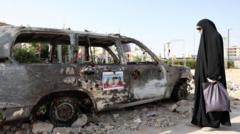Amid recent attacks and rising tensions, Qatar is quietly mediating a fragile cease-fire between Israel and Iran, showcasing its diplomatic resilience while managing its own security concerns.
Qatar's Diplomatic Maneuvers Amid Israel-Iran Tensions

Qatar's Diplomatic Maneuvers Amid Israel-Iran Tensions
Behind its public stance of self-defense, Qatar plays a crucial role in brokering a cease-fire between Israel and Iran following escalating hostilities.
In a strategic and diplomatic twist within the Middle East, Qatar has emerged as a key mediator in the conflict between Israel and Iran, even as it faces direct threats to its own security. On June 24, 2025, before midnight, Qatari officials hosted a press conference to address Iran's missile assault on a U.S. military facility located near Doha. Foreign ministry spokesman Majed al-Ansari asserted Qatar's right to defend itself while simultaneously calling for a de-escalation of tensions and negotiations for a cease-fire.
Despite maintaining a public front of resistance following the attack, Qatari authorities were actively engaged in backchannel discussions to facilitate a cease-fire agreement between the two rival nations. Specifics remain murky, but it has been reported that Qatar was proactively fostering dialogue, liaising with both the Iranian government and U.S. allies of Israel.
The complex nature of the situation intensified after a U.S. airstrike on Iranian nuclear sites on June 23, escalating the cycle of retaliation with Iran targeting the Al Udeid base in Qatar shortly after. As it turns out, Qatari military officials had foreknowledge of the impending strike, successfully intercepting the majority of missiles aimed at the base, according to Maj. Gen. Shayeq Misfer al-Hajri, Qatari deputy chief of staff for joint operations.
Analysts underscore Qatar's balancing act in international relations, noting that its ability to take a hit while remaining pragmatic showcases its geopolitical relevance in a region fraught with conflict. Sanam Vakil, of Chatham House, commented, “What happened shows Qatar can take a hit but be pragmatic,” alluding to the emirate's calculated approach in navigating the tenuous affairs of its neighbors while keeping its national interests intact.
This development signifies a turning point in Qatar's foreign policy, showcasing its role as a mediator in high-stakes diplomacy, even as it must contend with its vulnerabilities in the face of hostile actions. As Qatar positions itself as a peacemaker, the international community continues to watch closely, given the potential implications for stability in the broader Middle East region.























